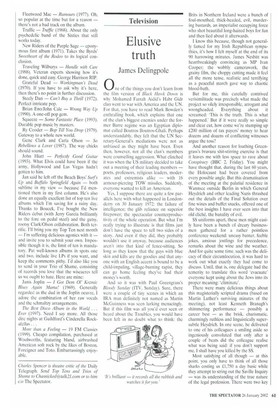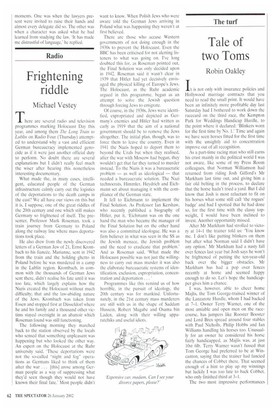Television
Elusive truth
James Delmgpole
One of the things you don't learn from the film version of Black Hawk Down is why Mohamed Farrah Aidid's Habr Gidr clan went to war with America and the UN. For that, you have to read Mark Bowden's enthralling book, which explains that one of the clan's biggest enemies under the former Barre regime was an Egyptian diplomat called Boutros Boutros-Ghali. Perhaps understandably, they felt that the UN Secretary-General's mediations were not as unbiased as they might have been. Even then, however, not all the clan's members were counselling aggression. What clinched it was when the US military decided to take out a meeting of their leading members — poets, professors, religious leaders, moderates and extremists alike — with 16 armour-piercing TOW missiles. Suddenly, everyone wanted to kill an American.
Yes, I suppose there are quite a few parallels here with what happened in Londonderry on 30 January 1972: the failure of intelligence; the glib reliance on superior firepower; the spectacular counterproductivity of the whole operation. But what I'm really trying to illustrate is that films just don't have the space to tell two sides of a story. And even if they did, they probably wouldn't use it anyway, because audiences aren't into that kind of fence-sitting. So long as they know that the guys with blue skin and kilts are the goodies and that anyone with an English accent is bound to be a child-impaling, village-burning rapist, they can go home feeling they've had their money's worth.
And so it was with Paul Greengrass's Bloody Sunday (ITV, Sunday). Sure, there were a couple of tiny scenes in which an IRA man definitely not named as Martin McGuinness was seen lurking menacingly. But if this film was all you'd ever seen or heard about the Troubles, you would have been left in no doubt what to think: the Brits in Northern Ireland were a bunch of foul-mouthed, thick-headed, evil, murdering bastards, an imperialist occupying force who shot beautiful long-haired boys for fun and then lied about it afterwards.
I know this because, though not generally famed for my Irish Republican sympathies, it's how I felt myself at the end of its 90 harrowing minutes. James Nesbitt was heartbreakingly convincing as MP Ivan Cooper; the wobbly camerawork, the grainy film, the choppy cutting made it feel all the more tense, realistic and terrifying as a peaceful march gave way to chaotic blood-bath.
But for me, this carefully contrived verisimilitude was precisely what made the project so vilely irresponsible, arrogant and wrongheaded. Everything about it screamed: 'This is the truth. This is what happened.' But if it were really so simple and clear cut, how come we're stumping up £200 million of tax payers' money to hear dozens and dozens of conflicting witnesses argue the toss?
And another reason for loathing Greengrass's bravura shit-stirring exercise is that it leaves me with less space to rave about Conspiracy (BBC 2, Friday). You might have thought that, during the last 60 years, the Holocaust had been covered from every possible angle. But this dramatisation of the meeting at the palatial residence in Wannsee outside Berlin in which General Heydrich and other leading Nazis thrashed out the details of the Final Solution over fine wines and buffet snacks, offered one of the best insights I have ever seen into that old cliché, the banality of evil.
SS uniforms apart, these men might easily have been a bunch of dreary businessmen gathered for a rather pointless conference weekend: uneasy banter, feeble jokes, anxious jostlings for precedence, remarks about the wine and the weather. And for quite some time, such was the delicacy of their circumlocution, it was hard to work out what exactly they had come to discuss. Until, that is, one delegate had the temerity to translate this word 'evacuate' everyone kept using about the Jews into its proper meaning: 'eliminate'.
There were many delicious things about this magisterially scripted drama (based on Martin Luther's surviving minutes of the meeting), not least Kenneth Branagh's shimmering performance — possibly a career best — as the brisk, charismatic, charmingly ruthless and linguistically supersubtle Heydrich. In one scene, he delivered to one of his colleagues a smiling aside so ingeniously convoluted that only after a couple of beats did the colleague realise what was being said: if you don't support me, I shall have you killed by the SS.
Most satisfying of all though — at this point, you only have to think of all those sharks costing us £1,750 a day basic while they attempt to string out the Saville Inquiry — was its understanding of the true nature of the legal profession. There were two key moments. One was when the lawyers present were invited to raise their hands and almost every delegate did so. The other was when a character was asked what he had learned from studying the law. It has made me distrustful of language,' he replied.



















































































 Previous page
Previous page